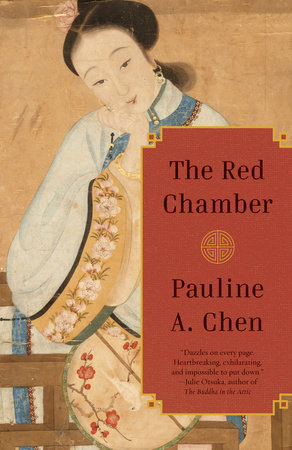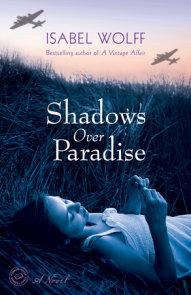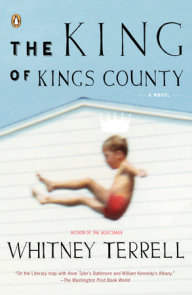READERS GUIDE
The questions, discussion topics, and suggestions for further reading that follow are intended to enrich your discussion of Pauline A. Chen’s The Red Chamber.Introduction
In her magisterial first novel, Pauline A. Chen reimagines Cao Xueqin’s great eighteenth-century Chinese classic Dream of the Red Chamber. Chen’s novel compresses the 2,500-page epic to a ferociously paced 400-page journey into the heart of a ducal palace, where the lives of three unforgettable women collide. Dayiu, an impoverished orphan adopted into the household, falls in love with Baoyu, the brilliant, unpredictable heir to the family fortune. Despite his love for Daiyu, the family betrothes him to Baochai, who hides her own passion under a dutiful exterior. Meanwhile, the young matron Xifeng struggles to protect the family from financial ruin, even as her husband spurns her for her inability to bear a child. Linking the three women’s fate is the jade, a mysterious stone said to have been found in Baoyu’s mouth at birth, which seems to foretell a strange and extraordinary destiny for him and the entire family.From the petty gossip of the servants quarters to the political turmoil that will overthrow the dynasty and plunge the once-mighty family into grinding poverty, The Red Chamber is at once sweeping and intimate, a grand historical fiction that provides a singular lens through which to view contemporary culture, and the social, political, and romantic mores of our times.
Questions and Topics for Discussion
1. In the introduction to Dream of the Red Chamber, the eighteenth-century novel on which The Red Chamber is based, the author states that an important impetus for writing the novel was nostalgia for his pampered and carefree youth. How is the theme of nostalgia also central to The Red Chamber?
2. At the beginning of the novel, do you feel that Baochai is presented sympathetically, while Xifeng is not? Do you feel that these two characters “switch places” toward the end of the book, with Xifeng becoming more likeable and Baochai less so? If so, what is the process by which Xifeng becomes more sympathetic? Does Baochai retain your sympathy at the end of the novel?
3. Were you shocked or dismayed by Baoyu’s decision to run away from his family to become a monk at the end of the book? Do you feel that he was abdicating his responsibilities to his wife and family, or did you sympathize with his decision? Do you feel that The Red Chamber can be read as a coming-of-age story, with characters like Baoyu and Daiyu achieving a higher level of understanding or maturity by the end?
4. What are the sources of tension between Baoyu and his father, Jia Zheng? Can you imagine a father and son today experiencing similar types of tension? Do you consider Jia Zheng’s beating of Baoyu to be abusive, or does it seem understandable given the cultural context?
5. There is some controversy among scholars as to whether the female characters in Dream of the Red Chamber have bound feet. The Red Chamber follows David Hawkes, the eminent translator of Dream of the Red Chamber, in presenting the Jia women as adhering to the traditions of their Manchu conquerors and not binding their feet, as most Chinese women of the period did. (The Manchus were known for their athleticism and horsemanship, while Chinese culture was considered to be more highly refined.) Would the story have unfolded differently if the characters did have bound feet? Would it have affected your perception of the characters?
6. An alternate title for the original novel upon which The Red Chamber is based is The Story of the Stone. What is the significance of Baoyu’s jade to the story? If the jade is the family’s luck, how is Baoyu an asset to his family?
7. Does Lady Jia’s favoritism toward Baoyu affect how the other members of his family—the women, his father and brothers—see him? How does being her favorite shape his life? In what ways it is advantageous, and in what ways does it create unique obstacles and difficulties?
8. What type of male ideal does Baoyu represent? What is desirable or attractive about him? How is he different from a modern Western ideal of male beauty?
9. Is Baoyu a romantic hero or an antihero? How and why?
10. Discuss the relationship between Daiyu and Baoyu. Is this a relic of youth or true love that might have had great longevity and sustained them both had circumstances not intervened? Baoyu’s love for Daiyu proves to be deep and all-consuming, yet Daiyu feels herself to be forsaken. Does Baoyu love better than Daiyu? Would the two have achieved happiness together?
11. Baoyu and Baochai are believed to be destined to marry each other because of his jade birth stone and her gold pendant: “Gold and jade make a perfect pair” in the words of an old saying (page 59). What is the notion of destiny that is in evidence in the family, and in the society? In what ways might this notion serve the purposes of the aristocratic class to which the Jia family belongs? Does it inform marriage choices, for example?
12. Discuss the character of Ping’er and how she is transformed by her journey over the course of the book. Is she a sympathetic character? Why or why not?
13. Could it be said that the central relationship of Xifeng’s life is with Ping’er? How are they linked by bonds of friendship, rivalry, and sisterhood? How are these bonds broken, and in what ways do they ultimately survive?
14. Baochai is rigorous in observing the social codes and mores of her times. Does her propriety serve her well or poorly in a society that is undergoing political change? What does she gain by suppressing her emotions and serving her elders according to expectations? In what ways does she pay a price for doing so?
15. Daiyu and Baochai are paired in friendship and rivalry, as are Xifeng and Ping’er. Xifeng and Baochai win out in the Jia family, but it is a hollow victory. In what ways are Ping’er and Daiyu better off for having lost?
16. In the eighteenth-century novel Dream of the Red Chamber, the original ending was lost or suppressed, possibly for political reasons. What elements in the story could have been politically dangerous? If the novel reflected the life of the author’s family, what aspects of their private life might they have wished to conceal?
17. Compare and contrast Daiyu’s eventual marriage with that of her mother and father. What social and economic sacrifices did both Daiyu and her mother make for the sake of either love or marriage? Would Baochai or Xifeng have made those types of sacrifices?
18. Does The Red Chamber feel to you more like a classic or more like contemporary fiction? In what ways could The Red Chamber be considered truly a story for our time?




















